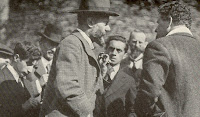 According to Max Weber's society is the result of a process of rationalization . This is a phenomenon (typically Western, but non solo) che interessa ogni ambito della vita culturale: il diritto, l'economia, l'arte, la religione, la politica e la scienza e che vede la razionalità affermarsi come unico criterio di interpretazione del mondo.
According to Max Weber's society is the result of a process of rationalization . This is a phenomenon (typically Western, but non solo) che interessa ogni ambito della vita culturale: il diritto, l'economia, l'arte, la religione, la politica e la scienza e che vede la razionalità affermarsi come unico criterio di interpretazione del mondo. Weber ha trattato in molti passaggi delle sue opere il tema della razionalizzazione ma, a detta degli studiosi, è soprattutto nell' Osservazione preliminare e nella Considerazione intermedia contenute nei tre volumi della Sociologia della religione (1920-21) che possiamo trovare la trattazione più chiara di questo tema cruciale.
Weber, fondamentalmente, vuole refutare la concezione materialistica della storia, con la sua celebre tesi su struttura e sovrastruttura. The rationale that led to modern society, for Marx, is essentially linked to the social relations of production , the practice, which is linked to economic interests, expression of the mode of production with which men control and organize the reproduction of their material existence. For Weber, however, the rationale that led to modern society is not simply an economic rationality guided by the imperative of reproducing such material. The process that led to the current social organization takes instead moves much farther in time, particularly in monotheistic religions, Judaism and Christianity in particular (but also myths). The monotheistic religions, in fact, represent a liberation from magic and then "rationalized" - meaning they make more "rational" - the relationship between the believer and the divine. Just think of the preaching of the prophets, to what Jesus says about the miracles or the famous episode in the Acts of the Apostles, of Simon Magus. The rationalization process
then begins with a disenchantment of the world, that is when the spell is broken, specifically with the transition from a conception of a magical kind of mythological concept (which is already a form of "enlightenment ", ie anti-magical explanation of the world and then to rationalize, as they understood Max Horkheimer and Theodor Adorno in Dialectic of Enlightenment ). In Sociology of religion read that "this great historical and religious process of disenchantment ( Entzauberung der Welt ) ... that rejected all magical means in search of salvation as superstition considering criminal, found here [ in Protestantism] to its conclusion. " So the disenchantment is the beginning, not the end as it is still written in many textbooks, while the process of rationalization is ongoing.
In the modern world is in fact finished the 'spell', which literally means "Bind" someone or something through the recitation of incantations, by imposing its will or taking away one's own. Oracles, wizards, warlocks, shamans, sorcerers, astrologers, alchemists, fortune tellers are the typical representatives of a religious pre-rationalized, expression of the attempt to dominate nature, to bend the laws by subjecting them to human demands (with formulas, rituals, sacrifices also human, etc.).. In the book of the prophet Isaiah, God addresses the people of Israel, "my thoughts are not your thoughts / and your ways are not my ways" (Isaiah 55:8). This means that the God of the Bible does not agree to be affected by human demands and folded. He is absolutely free and acts independently of all human attempts to propitiate magically, with ritual sacrifices or prayers, his benevolence. This lays the groundwork for the expulsion of the religious experience of the world (asceticism) and makes that the only plausible picture of the world becomes its scientific representation, based on a causal mechanism devoid of purpose.
This means that in the modern world has now reached a point beyond which you can not produce a further disenchantment. " But that does not mean that the old forces, gods and demons have been defeated forever. This was rather the pretext of Comte and the positivists, who ended up transforming science into religion secular modern world. But science produces a sense of desert, while the man remains a need for "effects of meaning" and therefore be, at least in part, "reincantato. This explains the strong contemporary charmer for compensation esoteric (masonry, sects, cults, neo-pagans, etc..), The return of religions, available in more dogmatic and uncompromising (and fundamentalists), the importance of emotional-affective measures (for es. love) and traditional (rituals, etc..) nevertheless takes place in a streamlined cosmos, the subject of calculations and predictions of instrumental rationality.
emerges as a new reincantamento the world that Weber describes as "polytheistic" that is a real revenge of the old gods and demons - that becomes our postmodern ethos. The paradox is that it is streamlining itself to give ourselves to a world populated by multiple and irreducible sense of values \u200b\u200bto each other (the one that Schmitt rejected as "tyranny of values" ), because now everyone decides for itself how to give meaning their lives ( cultural pluralism), also with religions "do it yourself."
In this sense we can say that Weber was the last of the first of the modern and postmodern, and this is where lies its current depth.
0 comments:
Post a Comment